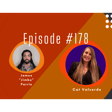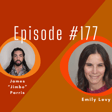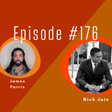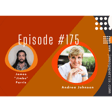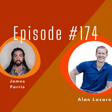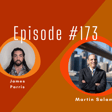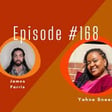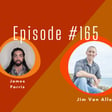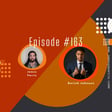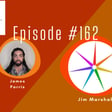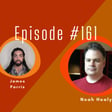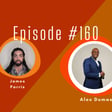Introduction and Guest Welcome
00:00:06
Speaker
I am Jimbo Paris and you're listening to the Jimbo Paris show. All right. How's it going, everyone? This is Jimbo. Welcome back to the show.
Katarina's Background and Career Path
00:00:21
Speaker
And today we have Katarina Polonska. Forgive me if I pronounce that last name wrong, but so she's basically a highly accredited relationship coach.
00:00:33
Speaker
as well as also a mindfulness teacher. So I guess she teaches people sort of about relationships, mental health, those types of things. And you know, I'm going to be interested. Let's get to figure her out some more. Cool. Yeah. Thank you for having me. Yeah. My pleasure. How are you doing today?
00:00:54
Speaker
I am good. I'm calling from a very dark Airbnb basement suite as part of my digital nomad year. So apologies for the bad lighting. No, it looks fine. It looks fine. To get this started, can you kind of give me a gist of who you are, what you're about and what your message is?
00:01:15
Speaker
Yeah, sure. So I'm a accredited transformation coach specializing in relationships, as you mentioned, and my backgrounds in behavioral science and gender dynamics. So I've spent pretty much my entire life growing up in an Eastern European household, immigrant in England,
00:01:35
Speaker
and studying gender, studying masculinity, femininity, the different interactions between the genders. My father raised me very kind of much focused on this. I grew up with very traditional stereotypes of what it means to be a woman and what my life would look like and I naturally rebelled against that for a long time.
00:01:57
Speaker
Yeah, throughout my academic life, went on to do gender studies at Oxford on a scholarship and just really looking at how limited the models of masculinity and femininity that we have in the kind of traditional
00:02:12
Speaker
sense. And then in my behavioral science work, which I was doing more kind of in the corporate space, I was a regional vice president for a consultancy doing organizational development across Canada and the West Coast, that's browse based. And looking at how do these kind of limited models impact how we show up in our day to day? And how do they get in the way? How do they ultimately sabotage our ability to connect with others?
Influence of Upbringing on Career
00:02:37
Speaker
And that eventually led me into becoming a coach. And I started out by working with founders and executives and working on really kind of normal issues, I guess, working on burnout, anxiety, stress. But what I realized after a couple of sessions of working with everyone was that fundamentally, it was relationships that were at the heart of everyone's struggle, whether it's a relationship to self or relationship to others. And so that's what led me into, yeah, into becoming a relationship coach.
00:03:06
Speaker
So what was it like being an immigrant in your life and can you kind of go a bit more in depth on sort of how maybe the relationships you had with your family maybe in particular your father may have sort of influenced you into going down this career path? That's a really good question no one's asked me about before but it's uh yeah it's quite telling so
00:03:31
Speaker
definitely grew up with very kind of traditional models of what it meant to be a female. So on the one hand, my mum is incredibly successful, ambitious, driven. My dad is ambitious, successful, driven.
00:03:47
Speaker
and fundamentally that led to the breakdown of their marriage because there were two people who were both really successful prioritizing their careers but it eroded the relationship and now I kind of look at it and I can understand why it's because they
Balancing Traditional and Modern Roles
00:04:02
Speaker
they weren't really each other's match in terms of what they viewed the other person to need to be. And so I grew up with this kind of model of, on the one hand, my mom was pushing me to be, you know, go be a feminist, go build your career, go actually build something of your own, go generate your own wealth and
00:04:18
Speaker
and be successful and then my father was kind of telling me that but also like this message of you don't know what life is unless you're a mother, you don't know what life is unless you're a wife and you're in a relationship and so I had this kind of very polarizing narrative and I went to a really amazing girl school with really incredible bright women and I saw the same kind of polarization happening there
00:04:44
Speaker
that there was this kind of tension of like, do we become really ambitious, driven alpha females? Or do we actually need to go find a breadwinner and cool it and stay home and raise a family? And now kind of where I'm at, it's like, you don't have to pick to an extent you do. Sure. But you can still be yourself and still have the kind of relationship where you are allowed to be the full spectrum of who you are as a human being.
00:05:10
Speaker
That's really fascinating because I'm thinking now when you decided to sort of go down this path and sort of accept these two polarizing sides of yourself really as just one thing, college starts, right? You graduate high school. What was your mindset sort of going into college? Were you always interested in these dynamics of gender or
00:05:36
Speaker
Did these sort of slowly develop more and more? Because you talked a bit about the developmental process to me here, but I'm wondering now, what happens in college? Because college is a big thing. You have parties, you have friends, you have to study. How did you begin to sort of discover yourself even more down that road?
00:05:54
Speaker
Yeah, really good question. So I went into University of my undergrad already being trained as a coach. I did my first coaching qualification when I was 17, really young. My dad kind of again pushed out on me and I'm very grateful he did. So I actually went in thinking, I don't know if I even need college. I'm going to be an entrepreneur. I'm going to build a business. And I had a tiny little business at uni. But in the end, I got into the academic life. I really enjoyed it.
00:06:21
Speaker
And I didn't start out that interested in the gender dynamics, but as I studied kind of American history, I did like history and literature as I studied more and more.
00:06:34
Speaker
And then I looked around my kind of the people in my life and I looked at my father, my brother, my partner at the time. I kept seeing this trend of men, white men, who have ostensibly everything, right? Very privileged. Like they have a good background, they have a good education, they have all of the options available to them.
00:06:58
Speaker
And I kept seeing what I understand now to be this kind of disenfranchisement, this I hate to use it, it's kind of like victimhood mentality. And I was frustrated, confused, I didn't understand like how is it
00:07:13
Speaker
that you can have everything and still feel like a victim and still complain about your life circumstances, still feel weak and unable to achieve what you want to achieve in society. And so that's what got me looking, I specialised in looking at disenfranchised white American masculinity and being like,
00:07:34
Speaker
why is there so much anger and victimhood here from like the 1980s to the present day? And that's when I understood that masculinity and like neoliberalism but really that kind of traditional model of what masculinity should be.
Evolution of Relationship Understanding
00:07:50
Speaker
is completely limited. It doesn't really allow for the full humanity of the human experience of expressing emotion, of actually wanting to do more traditionally feminine quote unquote things, of actually being nurturing, being caring, being sensitive, being soft. The main vehicle to communicate that kind of emotion, at least back then, I think it is beginning to shift a little bit, but was anger. Like anger or silence, it's kind of retreat and withdraw or get angry.
00:08:19
Speaker
and yeah and so that's kind of what got me looking at it all and getting more and more fascinated and realizing gender the kind of traditional gender is really limited like it's not enough so so how did learning these things sort of affect your world you know going into maybe grad school maybe you as sort of becoming this teacher this coach and sort of
00:08:45
Speaker
maybe now the relationships you have now with the men in your life because obviously now your lens has sort of changed a bit on society as a whole now and even yourself. Yeah it gave me a sense of a common humanity
00:09:01
Speaker
and a sense of like even though of course we're different biologically but at the end of the day we're all human and everyone ultimately experiences the same emotions even if they're driven by different things and fundamentally everyone has pretty much the same kind of needs really we all want to be loved we all want to be seen we all want to be heard we all want to be safe
00:09:23
Speaker
And that both humbled me and gave me a lot of compassion. And now when I'm doing the relationship coaching and I work with clients, I see time and time and time again, there's a misinformation about what healthy gender dynamics are. So I see women who are ambitious, driven, successful. And in their minds, they're like, well, I need an alpha male. I need a very traditionally dominant
00:09:49
Speaker
strong man because he's going to match me I don't want someone who's going to be quote unquote weaker than me and so they go around looking for traditionally alpha men but that traditionally alpha man
00:10:01
Speaker
is actually very often a manifestation of toxic masculinity, which is not the type of masculinity we're working with. And so then there's a disconnect from what they actually want and what they actually need. And I see a lot of tripping up there. So again, there's a lot of kind of re-education around what healthy dynamics look like and ultimately what healthy behavior is, irrespective of your gender.
Transition to Coaching
00:10:22
Speaker
There's a lot of toxic femininity out there too.
00:10:24
Speaker
After sort of getting out with your Masters of Women's Studies, you sort of go out here. Were you always a coach during your college years or was it after you sort of came out? When did you know that you were ready to be a coach and that your goal was to sort of become this coach?
00:10:45
Speaker
Yeah, good question. I think like a lot of coaches and something else doing is doing anyhow, you know, kind of informally, I actually started my career being an entrepreneur in a, in the champagne and fine wine trays are very different. I, I started a business out in Spain. I was importing, distributing champagne. And then I moved to the middle East and I was working and living out of Dubai. And it's in Dubai that I became really passionate about.
00:11:09
Speaker
gender dynamics and justice and re-education here because I saw within Dubai such limited models of what men and women should be and such different hierarchies and biases and it was very toxic so at that point I became really passionate about working in the field and after doing my masters I actually went to work in
00:11:33
Speaker
humanitarian aid work and philanthropy working on agenda policy and even there I saw so much again like
00:11:40
Speaker
misinformation, and it was very frustrating. I worked for a couple of the big NGOs in just kind of short term. And yeah, it was my disillusionment with Blancheby that led me to behavioral science, working as an organizational kind of consultant for different companies. So based out of Canada, I moved to Canada, I was working with Fortune 500 100 companies, startups, and helping advise them on their dynamics. My specialization given the gender background was diversity, equity and inclusion.
00:12:08
Speaker
so I kind of specialised and trained further in that field and again I really loved working with people in this space. I did find that doing group group training and kind of working with groups of people was more limited than doing one-on-one because with something so personal and vulnerable and something where there's a lot of resistance and blockers there's a lot of again miseducation and fear around change
00:12:32
Speaker
that doing group work wasn't getting the results that one-on-one can get. And that's what really began to kind of put this idea in my head that actually one-on-one work is where the magic really happens, at least in this world, in this kind of intimate world.
Behavioral Change and Mindfulness
00:12:46
Speaker
And so I worked for a huge coaching company, like one of the biggest coaching companies in the world of their tech.
00:12:51
Speaker
unicorn and I learnt a lot there, had really incredible coaches and actually was the really incredible coaches who kind of finally sealed the deal for me. After working with them and seeing how much they transformed my life, I realised, okay, this is something I want to do. I'm going to step out of corporate, step out of kind of being that VP role and train as a coach and go into this full time. So it wasn't something I did always. It's kind of slowly chipped away and become something that I've adopted.
00:13:17
Speaker
So one thing that really, really I found interesting is that said you, you study a lot of behavior science, right? Okay. So from what I'm getting, you're, you're familiar with sort of how attitudes were, how general persuasion strategies were things like, you know, central process, peripheral processing, interesting nuances. And do you think those dynamics of behavior or
00:13:44
Speaker
The way you sort of study behavior changed when you went from the more corporate route to now. This route sort of just working with more of the common public, I like sort of the types of people you are working in terms of behavioral science because you might be. Doing things like I'm just assuming this were you doing more marketing strategies for these types of things or.
00:14:06
Speaker
No it was more learning and development so it was like yeah yeah so it was like imagine I'd have a company like a I know like an oil company from you know northern Canada and they're 95% white blue-collar men and they have a real problem with bullying and aggression and
00:14:26
Speaker
and like essentially gendered violence like the women in the company were traumatized and my role would be to come in and diagnose the issue and understand what's happening and then build a strategy to address that and then I would deploy the teams of people the psychologists who would go and actually do the training and the education and the enablement and all of that so really I was pretty removed I was a consultant and not working on the ground if that makes sense.
00:14:52
Speaker
So sort of working with those types of groups as a consultant, how did that sort of carry over to, you know, sort of just becoming this social scientist working regularly?
00:15:06
Speaker
Yeah, so I think the main thing is what I was on the hook for, which is how do you drive behavioral change? So if I'm working with this, this organization that really need ultimately more DNI, but the budget holder probably doesn't believe in DNI, and they don't know why they need it, and my role is to really reeducate them and persuade them that they actually need it.
00:15:28
Speaker
How do you actually create organizational transformation, which is kind of like a macro level of how do you achieve individual transformation? And the biggest kind of thing that I've carried over that I use on a day to day is something called the Combi model. Combi model is like a theory of change for behavioral change.
00:15:47
Speaker
So the first step to any behavioural change is to identify the motivation. So what does the person who's changing need to believe or feel in order to be motivated to change? So driving motivation is number one. Number two is what capabilities do they need to have in order to be able to do the change that they're trying to do?
00:16:07
Speaker
So what kind of behaviors do they need to learn? And then step three is what opportunities do they need in their day-to-day to be able to practice the new behavior that they've learned? And so what that looks like is, I use a really simple example, like someone is trying to lose weight, for example. So first they need the motivation to lose weight. What is driving them on an inner level, not an external level, I mean, it might be external, but internal motivation is a bit stronger. What's driving them to lose weight? It might be health, because actually they have children and they want to be able to play with their children and they want to be like the best parent that they can be.
00:16:37
Speaker
it might be an external goal. They have a wedding to get thin for, whatever their driver is. But getting really clear on that motivation is really important in order to fuel the passion and the energy into doing the change. Then step two is the capabilities. So how do they actually go ahead and lose the weight? That might be re-educating them on exercise, on diet, on whatever kind of blood type they have, whatever it might be, but creating that education and then the capabilities of how do they actually do that on a day-to-day basis.
00:17:06
Speaker
And then step three is the opportunity. So it's all very good and well to have the motivation to lose weight, know how to lose weight. But if you're in an environment that doesn't support that, because maybe you're travelling 24-7 and you don't have access to a kitchen and you can't actually cook your own meals, or maybe you don't have the budget, or maybe your family don't actually enjoy eating healthy,
Empowerment and Client Success
00:17:27
Speaker
And that's going to get in the way. So step three is how do you create the opportunity to actually practice the new behaviors and integrate them into your day to day. And so with these three things, we can drive behavioral change. And that's something I use pretty much every day in my coaching. So it seems almost like you have, you know, an approach and then sort of a bit like a design theory in a way where you kind of execute it. And, you know, that's interesting because it kind of, it reminds me of like a little bit
00:17:56
Speaker
somewhat of like the elaboration likelihood model where you sort of focus on changing a person's logical perception through emotional actions. I think that's kind of an interesting thing because I think that's what the group work is for. You sort of create a setting where you can kind of emotionally shift the audience through
00:18:20
Speaker
information, you know, that sounds authentic, that sounds true through your teachings, and also maybe even through your mindfulness teaching, you know, which can all help to sort of relax people and emotionally guide them to think in a more logical way. So that's an interesting thing. Now, your actual approach, you know, in that process, you explain, I don't know what that is, but I learned something new there. But
00:18:44
Speaker
that also seems quite interesting too. And do you think that the mindfulness coaching sometimes plays a role occasionally to sort of help with this shift with relationships and sort of that change you mentioned?
00:18:58
Speaker
Yeah, hugely, hugely. So the mindfulness element is really important for helping people connect to their bodies because the body has a lot of wisdom. Often, again, especially kind of the very high achieving, intelligent driven people, we're very up in our heads and very disconnected from the neck down. And that means that we're kind of caught up in purely logic and we ignore kind of the gut responses, the emotion, the physical side of things.
00:19:26
Speaker
And at the same time, when we think about all the information out there around us, the body is subconsciously taking everything in, right? So the body has a lot of wisdom that we don't necessarily tap into. And so with mindfulness, I help people connect to their bodies and actually connect to their gut instincts, connect to what's coming up for them and begin to discern what is it that's coming up with them? Is it actually a gut instinct telling them about some potential danger that they might be in?
00:19:52
Speaker
some potential in dating like red flags that they might rationalize and ignore as something I used to do like rationalize and kind of logically think their way through without really listening to the inner I call it the inner tapping but like the inner gut instinct it might be that the body's sending up
00:20:07
Speaker
anxiety or fear which in society we typically want to ignore anxiety ignore fear and kind of dismiss it but actually it has a lot of wisdom and if you really listen to that anxiety and tap into that anxiety and work with that anxiety we can glean a lot of wisdom about what we might need to look at what we might need to work on things that we might not have enough knowledge about different areas for growth
00:20:31
Speaker
And so same thing with fear. Mindfulness helps us work with our body to be able to make more informed decisions and be able to move through things more, I don't want to say empowered, but I guess in a more empowered way, rather than just using our logic and reason, which can be limited. And you sort of mentioned kind of helping people to move in a more empowered way. So what is your definition of sort of empowering your clients?
00:20:58
Speaker
Yeah so that really comes down to step one, this is what I do in the first month, helping people get out of their own way. So we all self-sabotage as part of the human condition, we often trip ourselves up and we don't know what we don't know. So we all have our own blind spots, we all have our own psychological blockers, we all have our own biases, we all have our own limiting beliefs, we all have our own stuff,
00:21:23
Speaker
that is living up in our head and replaying and telling the same stories. And until we have someone who can hold up a mirror to reveal that to us and then challenge it and explore a different way of being or a different way of thinking, then we're going to stay stuck. And that's what I see is happening in relationships. It's pretty destructive. So it's quite interesting as well seeing all the different blockers that all of my clients have and the different patterns between them. But also they're very disparate sometimes.
00:21:52
Speaker
So it goes to show that what you believe is ultimately what you want to believe, truly, you can you can choose to believe what everyone believes. So, helping them get out of their own way is is one of the first things and then the second thing is helping them get really clear on what they actually need. So, I can talk about this for days but
00:22:12
Speaker
when we're highly intelligent rational driven people we're very good at thinking we know what we want, we're very good at kind of like having a checklist, having our criteria, having our strategy and having our little KPIs whatever it might be and we typically tick them off and then we think we know what we want but actually what we need is very different or you know it might be kind of in the same vein but it'll have a nuance to it that we might otherwise ignore and what we really need is coming again typically from the core it's coming from
Coaching vs. Therapy
00:22:41
Speaker
from a deeper part of ourselves, from a more primal part of ourselves that we often forget about or we dismiss. And so then when we, you know, we're building relationships or we're even like picking career decisions, whatever it might be, often we're getting in our own way and then thinking very rationally about what we want. And the two things without the depth and the nuance and a different perspective can take us down a road that we've probably been down before and probably isn't going to get us where we want to get to. Does that make sense?
00:23:11
Speaker
I'm interested now sort of in what are some of your best client success stories? You know, what are some of the clients that really, really help to motivate you that you sort of push out as sort of examples?
00:23:24
Speaker
Yeah, one of my favourite ones is it's a woman who, yeah, had previously been engaged and it had all ended and she was devastated and actually heartbroken. And then coming from that broken place was very clear that she didn't want to make the same mistake again. And that's something again I can relate to.
00:23:46
Speaker
She didn't want to make that same mistake again. And so when we began working together, it was literally within the second week that she had that aha moment of got it. This is where I've been blocking myself. This is where I've been thinking certain things that have made me get in my own way. And so the unraveling of the unhelpful, essentially like psyche that was keeping her stuck and keeping her repeating the same patterns was very quick.
00:24:12
Speaker
And so we're still working together, but she's probably my, I shouldn't say, probably one of my favorite clients because the ah-ha moments just keep coming so quickly. And there's very similar stories of, I have one client who was questioning whether he should break up with his partner because he kept kind of flip-flopping from feeling hot and cold, hot and cold. And he was convinced that it's something about her that's wrong, that actually he needs to walk away. And that's very common as well. People break up relationships.
00:24:40
Speaker
almost prematurely because they haven't actually looked deeper within at what's going on inside of them. And so after doing the work, he got the clarity that he needed on what it actually is that he needs to work on as opposed to just terminating the relationship. So what you're saying here is that it's crucial to sort of have good self-perception as well.
00:25:01
Speaker
So you see, that sounds interesting because even though a lot of times you do sound like a coach, I sometimes feel like, you know, a lot of these relationship coaches can occasionally veer into the routes of therapists. Would you say that's also something that's true? To an extent, yeah. The difference is that therapy will typically stay in the past, keep looking at the past and can keep circling back to it.
00:25:28
Speaker
I've had therapy for like 15 years and I never had any therapy that gave me clear present moment direction and strategy. And that's something I'm really passionate about. So when it comes to coaching, it really is like, okay, well, what do you know from your past? Let's do a little bit
Future Plans and Contact Information
00:25:44
Speaker
of work there. But really, we're bringing that information to the present, making our peace with it, solving for it, and then building a strategy forward. It's very kind of outcome orientated.
00:25:53
Speaker
So I'm thinking here, you know, what is the what is the future of your business? What is the future of your brand? And sort of, you know, what would you be interested in doing? Maybe starting a podcast, writing a book, you've already have books, write some more books. What's the plan with that? So right now, I'm focusing on I have a 12 week program, a 12 week system to take people from essentially not knowing where they're going wrong. And people are single people, people who are dating around and
00:26:23
Speaker
They have everything in their life figured out, you know, they've got their home, they have their career, they have their family, they have their friends, but they cannot figure out what's going on in their relationships. And they might be going on dates and having fun, but they're kind of like, nothing's clicking and they don't know why.
00:26:39
Speaker
And they just, they don't have time to waste. So I have this 12 week program, which is super comprehensive and it takes them really from kind of point A to the finish line of getting complete laser clear clarity on where they're going wrong, how to stop self-sabotaging, how to get out of their own way, get laser clear on what they want and need.
00:26:57
Speaker
understand masculinity, femininity, and how that's showing up in their lives and might be holding them back, understand attachment styles, understand the science of dating, and actually what are the psychological blockers that we have on a day-to-day basis when we're out there and we're single, how to overcome those, and then how to actually build a strategy and a life going forward that really allows them to attract the ultimate match without making it like a horrible, pressuring, stressful experience. And so that's the focus for now, building that.
00:27:26
Speaker
and by building that I mean kind of getting more and more traction and more and more people through and then I don't know once I have say a thousand people through that I'd love to write a book, would love to write a book and actually make this a you know a very formal system. I keep saying I'm going to do a PhD, probably don't need a PhD that's my own inner academic but would love to do that at some point and formalize the process. But you would be interested in a book, would that book be more of an autobiography with maybe a few good
00:27:54
Speaker
insights to sort of your teachings or would it be just more of a an academically inclined book just focus on information or more of a self-help book or basic level just trying to teach people. Yeah I think it'd probably be more self-help that's what I've grown up with I think I've read all of them at this point.
00:28:13
Speaker
All right, well, this has been an excellent interview and I definitely learned a lot from you. Hopefully you enjoyed this as well. Yeah, thank you. So yeah, are there any final words you could say to the audience and sort of how can they all reach? Yeah, no, absolutely. So huge shout out to anyone who is single and tired of trying to figure it out. Get in touch with me. I can help. Email is info at Katerinapalanska.com. I'm sure we'll have the spelling in your show notes.
00:28:43
Speaker
because my surname is Tricky, but you pronounce it well. Or go on my website, www.catcherinaplanska.com. You can also find me on LinkedIn. OK, thank you for watching the Jimbo Paris show. I'll see you next time. I'm currently working on a passion project that I'm really excited about, but I need your help to bring it to life. We'll be launching soon our very own Jimbo Paris Academy. This is going to be about aspiring creators and creating concepts.
00:29:10
Speaker
Thank you for your support. I'm sharing free bonus content with supporters. So let's make some amazing content together. Our affiliate partner, Lifework Systems, focused on helping create a better collegial environment, looking at the mental health of business workers, business employees, and overall bringing the business up.
00:30:02
Speaker
Thank you for listening.

